Anatomy of an Era: Bryan Carpenter, Part 2
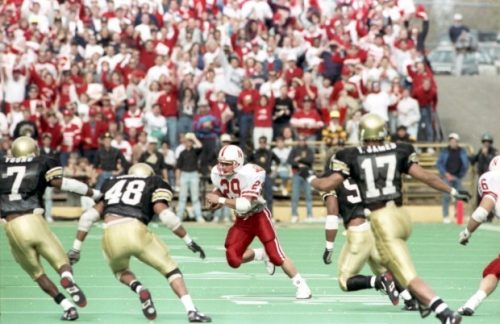
Excerpted from Chapter 102, No Place Like Nebraska: Anatomy of an Era, Vol. 2 by Paul Koch
Anatomy of an Era: Bryan Carpenter, Part 2
Q: Did you guys also do the pre-game psych-up videos the players began seeing?
BC: Yeah, we did. We did those all the way up until when HuskerVision came in, and they were a little better equipped to do it. Ours were a little more raw and to the point. (laughs) We’d pick some loud music. And one thing we liked to do was bring some of the players in. We’d get a lot of guys who would come in and hang out in the video room; it was all different guys, different players, you just kind of became friends with certain guys. Cory Schlesinger would come in there and you could talk about the position, or you might not even talk about anything in particular. You could find out what they liked and what would get their teammates fired up a little bit, pick their brains about certain things. We’d try to put assemble something together from the game we’d just played, maybe, the big plays.
If it was an opponent like Oklahoma or Colorado we might even go back in the archives and pull out some old things, ‘Hey, here’s when Mike Rozier did this,’ and just show a everybody all the way through, a little bit of tradition about it and things like that. It was fun to do. Sometimes it was tough to come up with something if we were playing Akron or somebody. (laughs) It was always fun for the big games, they were always the games you could really have some fun doing something.
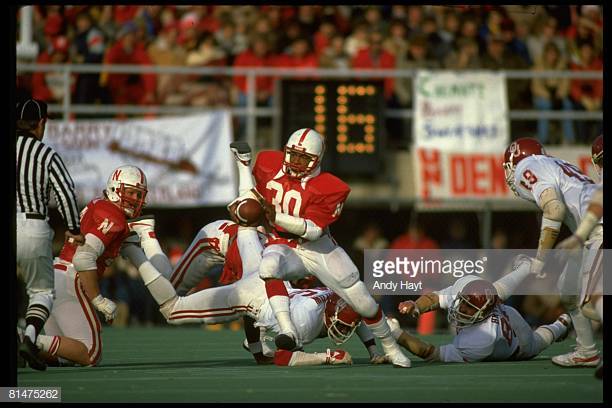
Mike Rozier vs. Oklahoma, 1982
(Photo by Andy Hayt/Sports Illustrated/Getty Images)
Q: Funny you say that. I’ve heard a specific tape mentioned that had to do with the ’94 Orange Bowl game versus Florida State, the one with Phil Collins’ In the Air Tonight just before they left for the field..
BC: Oh yeah, that was a HuskerVision thing. That was the start of those guys doing it. We did the tapes at first, and they tried to take it to a whole new level, which they did. They were a production studio, so they really did a lot of good. And they filmed every game like a network would film it: up close shots, down on the field shots, so they really had a lot of good footage to put together. That was probably the start of them taking it over. We were, ‘Wow, you guys just take over doing it.’
Q: I’ve heard that the team walked off that bus after watching the video just knowing they were going to win, knowing without question that they were gonna knock somebody on their can.
BC: Yeah, that was Jeff Schmall and those guys; Jeff and Shot Kleen and all those guys who did all that stuff. I might have a copy of that. I have a couple of them.
Q: I’d give my left pinky toe to see some of those old videos. (laughs) Speaking of technology, do you remember that was when the internet was just starting to make inroads?
BC: Yeah, isn’t that amazing, to be around when all that started? Your kids would never believe you, ‘I remember when the internet started.’
Q: So, about videotaping: where were you during the game? At what location was the filming taking place?
BC: I was up in the press box, they’d put you somewhere up there. At the home games we were right about at the fifty. But on the away games they’d just put you where the media was at; so usually the thirty, forty yard line somewhere, up on a roof somewhere. (laughs) That’s where I was always at. Sometimes it was tough, because when you’re a part of the media filming stuff there was no cheering, and you want to get excited for a game because you’re kind of part of some of it, but you can’t. It was fun to watch.
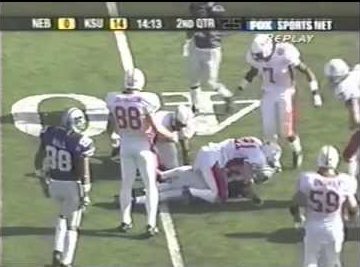
I kind of enjoyed filming sometimes and other times I didn’t, because when you’re watching it through a little bitty eyepiece it’s just not the same watching it happen. And you’d always sit watching the counter on the camera and when you’d get in the studio you’d be able to recall, ‘Oh, something special happened at this part of the tape.’ You couldn’t run it back and watch it during the game, but you couldn’t watch the replay on the big screen either, because you had to watch the next play and not miss anything. Then after the game, going back in after the game we’d have to edit the film and send it out to the next opponent you were playing, too.
Q: I was going to ask you about that. Wasn’t there a mandatory film-swap with other schools?
BC: Yeah, but you didn’t have to do it out of conference. In-conference you had to, you had to exchange the game film. Every Tuesday you’d get film for that next week and a half or whatever. So what you’d do, you’d edit that tape and then you’d have to send it -depending on where you were at- if it was Kansas or Kansas State, either you’d send a Student Manager or somebody and they’d just drive and meet somebody from the other school halfway and they’d swap the tapes out on Sunday morning or something. Then we’d get that tape and do the breakdown for the next week’s preparation. Other games like Texas or somebody? You’d take the film to the airport and go counter to counter, and ship it that way.
We always let the head student manager do it because they got paid to do it. They could get time for it, and they always wanted the extra time. A lot of times those guys would go out partying after the game and we wouldn’t get done until later, so we’d put all the information together and pack it up and set it on the counter out there on the Secretary’s desk and those guys would come pick it up at whatever time and they’d have to get it to wherever. They would always do it, they found a way to make it get there. (laughs)
Q: You might have some student manager stopping by to pick up the film half-schnockered after a few celebratory post-victory beers? (laughs)
BC: Oh, yeah. Sunday morning we’d go in there about 10 o’clock, and a lot of times you’d get the film after they’d returned from making a trade. They’d always look pretty rough.(laughs)
Q: Were there certain things that we were capable of doing but were prevented because of NCAA rules?
BC: Yeah, they couldn’t watch any videotape during a game. You had to wait until after the game to watch anything. And we wanted to do the still shots like the NFL guys do it, looking at those Polaroids, too. We couldn’t do those. Instead, one of the things they used to do was have those guys up in the endzone drawing: those Student Assistant Coaches, they’d sit and draw the plays. (laughs) They’d sit up in the endzone and look at the front, just the alignment of the guys, because you could see it so much better from there. They’d have the little kids run it down to the sideline and Coach Osborne would kind of look at it. (laughs)
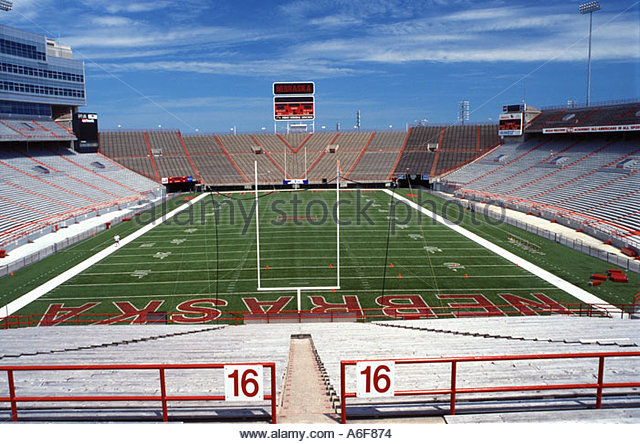
And I don’t know if they ever said it was against the rules, actually, but we kind of just quit doing it. We tried to do it at the away games, we always tried to find some tickets up in the end zone for away games. But K-State? Boy, Bill Snyder knew we were doing it so he sent security up there. (laughs) They kicked Mike Grant out of the game one time, it was pretty funny.
Q: Interesting. Would some teams not even do what we did?
BC: That was our thing: “Well, you can do it, too. Nobody’s keeping you from doing it. It’s not against the rules. It’s the same thing they do up inside the pressbox,” but you’re just trying to see the player alignments better. For some reason they quit doing it. It could have been a deal where the NCAA said you couldn’t do it, but they started restricting the number of people you could have doing things, too. So maybe we just didn’t have anybody else available to do it. (laughs)
Q: These kids running the cards down from the end zone, would they be little guys? Like grade schoolers or Boy Scout ushers or the like?
BC: They’d be Tony Davis’s kid or somebody like Milt Tenopir’s nephew (laughs), some relation to the coaches. You’d see ’em, and they’d give ’em those little cards and they’d take off running through the crowd down to the sideline and they’d give them to Coach Osborne. (laughing)
Q: And then they had to run right back up to the end zone nosebleeds for the next set of cards?
BC: Yeah, right back for the next bunch. (laughs) It was pretty cool.
Q: I’ll bet those kids sure did sleep well later that night, eh?
BC: Oh, yeah. They loved it, though. They loved doing it. If you put it in your book they’ll probably come out and say we cheated. (laughs)
But this is the biggest thing: I don’t know if everybody realizes what Coach Osborne really knew about the game of football. Like you said before, he was both Offensive Coordinator and Head Coach, and he could just get a feel for what was going on. He would get information from upstairs, but he still called the plays just standing on the sidelines, you know? (laughs) Usually you have guys upstairs calling a play because they can see things a little better. (I think Milt and Frank did a nice job of making sure he knew, “Hey, here’s some options for some plays. We could do this or we could do that.”) But he still just called the plays and had a feel for what he wanted to do, and he did it. He knew what he wanted to do for that week and we repped so many things in practice and did whatever he thought as the game played out.
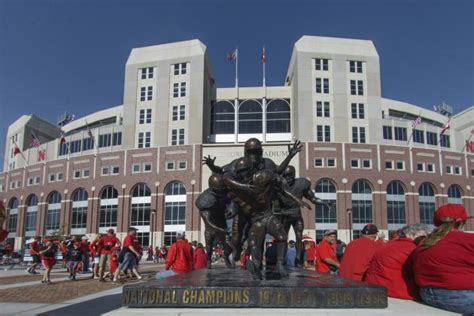
I mean, there’s so many ways to run option: it might be the same play call but from a different formation, some other way to run something that looked like something else. I think it was just real hard to prepare to play us, and we didn’t have all these crazy passing schemes. It was similar to all that passing, but we’d just run the ball. I don’t know how many people realize how rare that is, to have a guy that could do all the things he did. Watching film, he could probably watch the film and put a game plan together all by himself!
Q: He was something of a DaVinci of his time, do you agree?
BC: Yes. It’s pretty amazing. The thing I was really amazed by was how many guys were on the football team, and he had to work with all those guys. I mean, the varsity locker room alone there was 120-130 guys, and to get literally 4 deep at most positions ready to play in a game? I mean, now you’re lucky if some coaches can get just two deep ready to play every week. He just had a good way of organizing the practice -and I’m sure that had a lot to do with the other guys on the staff, as well- but for the number of guys we had and for the number of guys who could go in and play in a game? That’s probably why they wore people out so much.
Q: You brought up the staff members. What would you say about the coaching staff dynamic at that time? Any unique personalities, methods, contributions, contrasts?
BC: I think the whole group worked pretty well together. I mean, there were a lot of different kind of guys. Charlie McBride was so technical and would yell. Any of those guys you talk to loved playing for that guy and they’d do anything for him, but he was also a hard ass. You weren’t going to half-ass it and get by with anything. He demanded it from them, which is probably why they liked him so much, because he pushed them to be better players all the way from the bottom of the depth chart on up. You had to have a guy like that, who wasn’t afraid to get in somebody’s face and get the best out of people. Especially defensively, you know? So I think Tom knew he had to have a guy like that even though his personality was so different from that, you know? You’ve got to have people to do that kind of stuff and you have to let them do it. I think that’s probably why the defense was so good every year, because he let McBride do that.
Q: You were so in tune with so many of those guys, especially being coached by Frank Solich yourself. Could you talk a bit about Coach Solich or Turner or any of the other guys?
BC: Frank? I know Frank a little bit better. I liked Turner a lot and thought he was a real classy guy and he was a friend, the friend on the staff. He wasn’t a guy I didn’t have a ton of things to do with other than giving him some information he wanted.
But I played for Frank and then was a Graduate Assistant for him, so I obviously had a lot of respect for him. He was a hard, tough guy. A tough guy. (laughs) A competitive, tough guy. And when I was playing for him, sometimes I thought, ‘God, what do I have to do to make this guy happy?’ (laughs) It was like you were never good enough.
And it wasn’t until about the halfway point of my senior year, though, I finally realized, ‘Now I understand.’ And that‘s when it felt like I just played, I wasn’t worried about losing a spot or anything like that.
Q: You felt like you were finally “one of Frank’s guys”?
BC: Yeah, I started for two years, but that first year I don’t know if I ever felt like I deserved to. (laughs) It just felt like he was constantly picking at things, “Your first step was wrong,” “You didn’t do this right..”, even when you felt like you had a great game you’d get downgraded for something. He wanted to make sure you didn’t think you were better than you were, I think, and he didn’t stop trying to reach perfection in what you were doing.
And now I see myself doing that. I see the same thing with my kids. I do the same thing, ‘Hey, it takes all these little steps…every time you need to make sure you do all these little things where you don’t even have to think about them. If you do that then you’ll free your mind up to think about the bigger things, to do something else.’ That stuff’s just gotta come naturally for you, from the repetition. The other stuff, when you have to think while you’re in a game, ‘What’s first down?’ He just constantly was a perfectionist. And he still is, I’m sure.
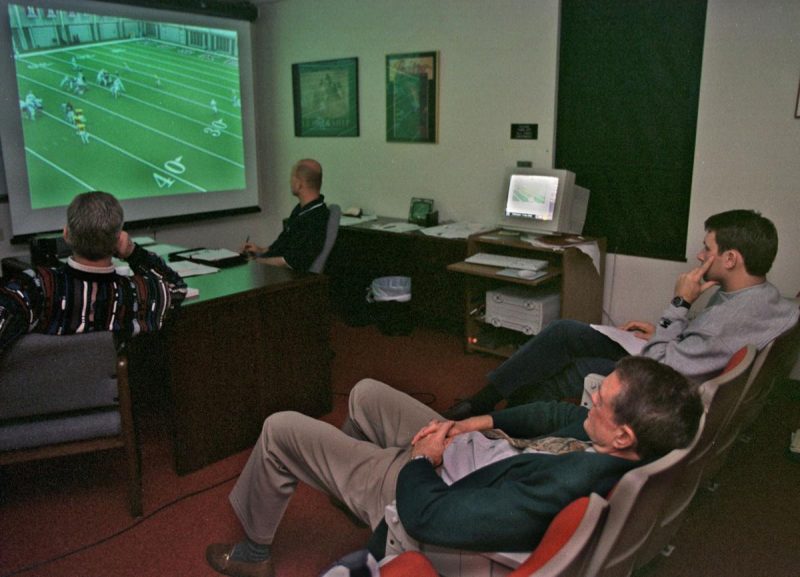
I never fully understood it until I was a GA for him, and then when I started to grade film and do everything with him I actually liked it so much more and was able to understand him so much better, because he was a good guy and he loved all of his players. I mean, you played hard for him, but sometimes you just felt like you couldn’t do it right, because he was such a perfectionist. I started seeing that when I was GA for him, and then I started to go, ‘Okay, now I get it. If you let a guy just get by on his ability you’ve let him down. You didn’t make him better, you just left him to be a good athlete and just kind of got through it.’
Have you talked to these guys who played for him? I talked to Cory Schlesinger here at a high school football game recently, and the guy they had here recently in that position, he didn’t even know how to do this drill. We were talking about, ‘Remember when we did this one drill with Frank? That’s all we did!’ Just little points that he’d make, continuously, you didn’t forget them. And it worked, because I can remember them and I can teach them to my kids. You talk to all those guys, they’ll be able to tell you all the drills they did, exactly. There was no reason to be different. He was just a perfectionist. He was an awesome position coach.
I thought he was a good head coach, too. I always thought it was a bad deal. He was the kind of guy that wherever he goes, he’ll always try to get the best out of them. It’s easy to tell a guy he’s great and let the guy who’s a good athlete do whatever he does, but Frank challenged them to make them better. And everybody can get a little better.
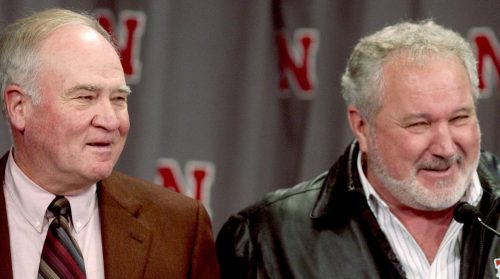
Dan Young & Milt Tenopir
Q: I would say, some of those meetings and the staff dynamic, was there any particularly unique piece of the staff dynamic?
BC: Tom always kind of ran the meeting, but then anytime when you were talking about the running game & blocking? Milt Tenopir. Man, he was the guy who could tell you if you could run it, because he knew if he could get his guys to block it, “I might have to have this guy make this call or block down this guy.”
That was just a great staff. I don’t know if you could get a staff of guys that had all coached that long, to stay and be okay with the positions they coached and not want to move up, not a lot of big egos, you know? I think that’s what probably made them so good. Everyone was pretty comfortable with what their job was, not where you get a young guy on staff and he wants to go become a head coach. Not that that’s a bad thing, but maybe if you take some pride and work on building a program that’s pretty big, there’s not much that’s left to accomplish. Virginia Tech and Florida State were that way for a while, but then everybody gets old. It happens…. Family is important. Not everybody wants to be a head coach with all the pressure of being a head coach, too.

Available on Amazon.com
Q: Did you have any particular frustrations, hurdles or challenges in doing your job?
BC: Not really. I don’t know if there was anything you couldn’t go and work out with somebody, that’s what made it a good place to work. If there was some sort of challenge, there wasn’t somebody you couldn’t go talk to and work some things out with.
To be continued….
Copyright @ 2013 Thermopylae Press. All Rights Reserved.
Photo Credits : Unknown Original Sources/Updates Welcomed
Author assumes no responsibility for interviewee errors or misstatements of fact.